|
|
|
Sort Order |
|
|
|
Items / Page
|
|
|
|
|
|
|
| Srl | Item |
| 1 |
ID:
131842
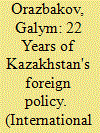

|
|
|
|
|
| Publication |
2014.
|
| Summary/Abstract |
THE LAST QUARTER of the 20th century was marked by growing globalization, which has impacted virtually all spheres of public activity. As it gained momentum, globalization has helped revitalize international collaboration, involving the world's leading economies and global international institutions.
From the early 1990s, vivid discussions unfolded in international political and scholarly circles about a new world order, the role and place of nation states and multinational TNCs in it, and the goals and methods of foreign policy amid the growing globalization. This process confronted many countries with the need to improve their competitiveness on the world market, striking an optimal balance between domestic and foreign policy.
|
|
|
|
|
|
|
|
|
|
|
|
|
|
|
|
| 2 |
ID:
131838


|
|
|
|
|
| Publication |
2014.
|
| Summary/Abstract |
FOREIGN POLICY of any state is a product and a common denominator of different and frequently opposite interests. Their combinations vary from country to country even if the process as a whole is affected by general global and social regularities, motivations and mechanisms. The relations between the United States and China have been and will probably remain in the field of interdependence and conflict.
Which factors are responsible for these motivations in China? How stable are they and how deeply rooted in the context of internal dynamics and the development logic of the Chinese socium? What social forces and institutions personify and determine them? Which mechanisms do Chinese politicians employ when seeking a compromise and the common denominator in their relationships with the United States?
|
|
|
|
|
|
|
|
|
|
|
|
|
|
|
|
| 3 |
ID:
131863


|
|
|
|
|
| Publication |
2014.
|
| Summary/Abstract |
THERE HAS BEEN no stable peace for a long time now in the Democratic Republic of the Congo (DRC or DR Congo), the key Central African country. Latent war in its eastern provinces has been going on for longer than one decade wiping off its democratic achievements and impeding the country's development. Arbitrary actions of the military, mass rapes, tortures, and the turning into slaves of young children and teenagers make thousands of people abandon their homes and flee for safety.1
|
|
|
|
|
|
|
|
|
|
|
|
|
|
|
|
| 4 |
ID:
131870


|
|
|
|
|
| Publication |
2014.
|
| Summary/Abstract |
IN MARCH 2013, "Unsere Mütter, unsere Väter" (Our Mothers, Our Fathers), a three-part TV mini-series, directed by Philipp Kadelbach, was aired on the Second German Television channel (ZDF) and the Austrian channel ORF. The film became a landmark in German war cinema, for the first time showing the viewer the undisguised horrors of the crimes of Wehrmacht soldiers against the population in the occupied territories, and aroused heated debates among the citizens of present-day Germany about what their "mothers and fathers" did on the Eastern Front and why. Simultaneously, a number of controversial storylines of the movie also provoked a stormy reaction from some Russian policymakers and Internet activists who demanded a ban on the movie as they felt it was openly anti-Russian, while at the same time calling for an immediate and explicitly negative reaction from the Foreign Ministry. Rather luckily for us, it did not come to that, while in contrast a certain diplomatic friction did arise between Warsaw and Berlin.
|
|
|
|
|
|
|
|
|
|
|
|
|
|
|
|
| 5 |
ID:
131864
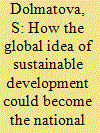

|
|
|
|
|
| Publication |
2014.
|
| Summary/Abstract |
HALF A DECADE has passed since the beginning of the global financial and economic recession in 2008. In this period, significant events have taken place and important trends have emerged, making it possible to review the preliminary results. This is being done not only by researchers and experts, but also at high-level social and political forums.
|
|
|
|
|
|
|
|
|
|
|
|
|
|
|
|
| 6 |
ID:
131867
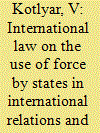

|
|
|
|
|
| Publication |
2014.
|
| Summary/Abstract |
IN ACCORDANCE WITH the UN Charter, a Bible of contemporary international law, all UN members "shall settle their international disputes by peaceful means" and "shall refrain in their international relations from the threat or use of force" (Article 2, Paragraphs 3-4). The Charter allows, in the form of an exception to this general rule, states to use force in only two cases - as self-defense against an armed attack from the outside (Article 51) and, following a UN Security Council (UNSC) decision, to remove a threat to the peace, breach of the peace, or act of aggression (Articles 39-42).
|
|
|
|
|
|
|
|
|
|
|
|
|
|
|
|
| 7 |
ID:
131841


|
|
|
|
|
| Publication |
2014.
|
| Summary/Abstract |
IT IS DIFFICULT to define the exact moment when in Europe there was a soft click of a switch and the "Belavezha Accords" were launched, which slowly but logically brought the European Union before our eyes. However, distinctly visible cracks appeared long before the financial crisis, which clearly polarized the interests of the "periphery" and the center, the new and old members of the club.
Today, sharp differences have come to light in the infighting between the founding fathers themselves, dissatisfied with Brussels and each other's policies. This applies to such fundamental issues as competition in the domestic markets, the distribution of benefits and credits, and migration policy.
|
|
|
|
|
|
|
|
|
|
|
|
|
|
|
|
| 8 |
ID:
131834
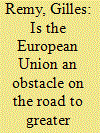

|
|
|
|
|
| Publication |
2014.
|
| Summary/Abstract |
WE ALL KNOW which states make up the European Union, so everything is clear about it, while "Greater Europe" remains so far a fuzzy idea. De Gaulle who looked at the problem from the geographic and historical points of view meant Europe from the Atlantic to the Urals. Today, half a century later, there are people who still doubt Russia's European nature. In an interview with Dmitry Rogozin (before he was appointed vice premier) a French journalist was taken aback by the remark 'When in Vladivostok I do not doubt that I'm in Europe; in Marseille, however, I'm not that sure."
|
|
|
|
|
|
|
|
|
|
|
|
|
|
|
|
| 9 |
ID:
131840
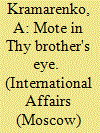

|
|
|
|
|
| Publication |
2014.
|
| Summary/Abstract |
Mr. Sestanovich makes clear his reason for this prediction, i.e. he doesn't like Russian diplomacy's success in turning things around in international community's response to the Syrian crisis. He does omit, however, a few facts of real consequence. Syria's chemical disarmament under UNSC Resolution 2118, indeed, represents a common denominator for all, including Russia and the U.S. But we didn't impose it on our partners. What we did is called providing leadership when our partners were confronted with impossible dilemmas. Britain resolved its own on August 29 through a vote of Parliament. The Obama administration faced a similar prospect in Congress. What is important is that the legislators of both countries reflected the prevailing mood of their public opinion. What is more, it was British Parliament that by its decision was the first to encourage President Obama to go to Congress on Syria, which ultimately led to UNSC unity.
|
|
|
|
|
|
|
|
|
|
|
|
|
|
|
|
| 10 |
ID:
131836
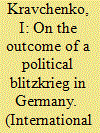

|
|
|
|
|
| Publication |
2014.
|
| Summary/Abstract |
THE VICTORY of Angela Merkel and the CDU/CSU bloc she led in the Bundestag elections of September 22, 2013 (41.5%) was expected and quite predictable1 - and therefore it came as no surprise to anyone. Significantly, this time around the Germans were not even electing a party, but a concrete leader with whom solely in a personal capacity are associated hopes for stability and firm-handed state management. What did come as a bit of a surprise was the defeat of the FDP, Christian Democrats' former ruling coalition partners, who with 4.8 percent fell out of big politics.
|
|
|
|
|
|
|
|
|
|
|
|
|
|
|
|
| 11 |
ID:
131837
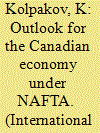

|
|
|
|
|
| Publication |
2014.
|
| Summary/Abstract |
CANADA was among the few developed market countries whose banking and financial systems did not experience any significant disturbances in the face of global economic instability.1
Having started in November 2008, the economic downturn was shortlived.
Six months later, GDP growth resumed and in mid-2010 its volume exceeded the pre-crisis maximum.2
In the third quarter of 2012, Canada's GDP reached 1.765 trillion US dollars.
According to a number of international experts, Canada is the most stable of the 20 countries with the largest economic potential.
The conditions of doing business in Canada, and its investment attractiveness are estimated very highly. More than that, according to such an authoritative magazine as Forbes, Canada was recognized in 2011-2012 as the world's best place for business due to low levels of taxes and red tape.3
|
|
|
|
|
|
|
|
|
|
|
|
|
|
|
|
| 12 |
ID:
131833
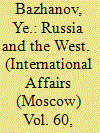

|
|
|
|
|
| Publication |
2014.
|
| Summary/Abstract |
IS RUSSIA A PARTNER of the West? This question has been repeatedly asked throughout centuries both in Russia and in the West. In the 13th century, German crusaders, with the Pope's blessing, invaded the Baltics and pushed further on to Russia, seeking political and spiritual domination. In Russia, this created a rift between those who wanted to draw closer to the West and those who saw it as a deadly threat to the unique East Slavic Orthodox civilization. The crusaders were pushed back, while Russia throughout three more centuries was learning, first unwillingly and later much more consciously, to associate itself with the Tatar-Mongol khans, the conquerors who came from the East.
|
|
|
|
|
|
|
|
|
|
|
|
|
|
|
|
| 13 |
ID:
131865
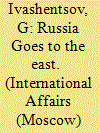

|
|
|
|
|
| Publication |
2014.
|
| Summary/Abstract |
THE YEAR 2013 has to a very large extent become a year of Asia for Russia. The 2012 summit of the Asia Pacific Economic Cooperation forum (APEC) in Vladivostok was followed this year by Russian-Chinese and Russian-Indian summits in Moscow in March and October, 2013. Vladimir Putin's participation in the APEC summit in Bali, Indonesia, in September, his November visits to Hanoi and Seoul, Russian-Japanese negotiations in a "2+2" format (foreign and defense ministers), and a number of other top and high-level meetings, showing that the Asia Pacific region is gaining ground in Russia's policy.
|
|
|
|
|
|
|
|
|
|
|
|
|
|
|
|
| 14 |
ID:
131872


|
|
|
|
|
| Publication |
2014.
|
| Summary/Abstract |
IN 2013, WE MARKED the 250th year of Russia's diplomatic presence in the Crimea; the real history of diplomatic relations between Russia and the Crimean Khanate is much longer. Far from simple at all times, until the early 18th century they were unfolding amid the never ending conflicts caused by devastating raids of the Crimean Tatars into the Russian lands and later, by the gradually rising pressure of the Russian Empire on the steppe. Diplomatic activity, however, remained high: the sides exchanged letters and embassies. At different times, Muscovy was represented in the Crimea by well-known diplomats N. Beklemishev, A. Nagoi, I. Sudakov, S. Tarbeev, V. Tyapkin, M. Zotov, and others. Some of them remained in the Crimea for a long time, yet their missions, like those of the Middle Ages, were temporary.
|
|
|
|
|
|
|
|
|
|
|
|
|
|
|
|
| 15 |
ID:
131866


|
|
|
|
|
| Publication |
2014.
|
| Summary/Abstract |
A LOT OF DEVELOPMENTS are constantly happening in the international arena. Some affect the interests of several states or groups of states, while others concern all world community members. In the latter category is the recognition of the rule of law at the national and international levels. With regard to international relations, it is about recognizing in them the rule of international law. This line of thought has been accepted in the United Nations and other international organizations. Over the past years, especially after 2005, the UN General Assembly and Security Council have passed a number of resolutions to this effect. Briefly summarized, they boil down to the recognition of the rule of international law, as well as the need to comply with it, creating the conditions for conflict prevention, the amicable resolution of disputes and controversies and the economic development of states and the entire world community. The resolutions stress that the line on recognizing the rule of international law is one of the main objectives of the United Nations, and that its bodies dealing with this problem should strengthen coordination with other international organizations and states.
|
|
|
|
|
|
|
|
|
|
|
|
|
|
|
|
| 16 |
ID:
131861
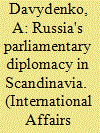

|
|
|
|
|
| Publication |
2014.
|
| Summary/Abstract |
DELEGATES of the Russian Federation Council led by its head Valentina Matviyenko paid an official visit to Sweden, Finland and Norway on December 2-5, 2013. They met with the heads of government and parliament.
In Stockholm, Valentina Matviyenko was received by King Carl XVI Gustaf of Sweden. She also had discussions with Foreign Minister Carl Bildt and Speaker of the Riksdag (parliament) Per Westerberg.
The discussions focused on cooperation in the Arctic, European issues and inter-parliamentary contacts.
"Our inter-parliamentary dialogue today is very constructive, very substantive and very open. I'm confident it will create more opportunities for our countries to expand and diversify Russian-Swedish cooperation. Russia is extremely interested in this turn of events," said the head of the Russian delegation.
|
|
|
|
|
|
|
|
|
|
|
|
|
|
|
|
| 17 |
ID:
131868
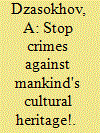

|
|
|
|
|
| Publication |
2014.
|
| Summary/Abstract |
Inter arma silent Musae (In times of war, the Muses are silent). This paraphrased ancient Latin maxim comes to mind now when the Middle East stretching from Libya to Iraq is in the grip of war. Its biblical regions, literally steeped in millennia of history and culture, are in the middle of a large-scale crisis caused by the 2003 aggression against Iraq and stoked by the so-called Arab Spring that started in 2011.
|
|
|
|
|
|
|
|
|
|
|
|
|
|
|
|
| 18 |
ID:
131831


|
|
|
|
|
| Publication |
2014.
|
| Summary/Abstract |
ON SEPTEMBER 27, 2013, the Security Council of the United Nations unanimously adopted resolution 2118 in support of the decision of the Organization for the Prohibition of Chemical Weapons (OPCW) made on the same day in The Hague to place Syrian chemical weapons under international control and dismantle them. This was the culmination of the Ministerial Week at the 68th session of the UN General Assembly in New York, an event which was expected by all, but not all believed that it would happen. All, however, eventually acknowledged that it came about largely through to the efforts of Russian diplomats who, led by Foreign Minister Sergey Lavrov, negotiated day after day with the U.S. partners, seeking a solution which not only would avert the threat of a military strike against Syria, but would also open the way for politically resolving the most complicated crisis in the SAR.
|
|
|
|
|
|
|
|
|
|
|
|
|
|
|
|
| 19 |
ID:
131830
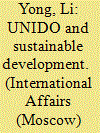

|
|
|
|
|
| Publication |
2014.
|
| Summary/Abstract |
THE RUSSIAN FEDERATION represents one of my first travel destinations since my recent appointment as Director General of UNIDO, and this is a strong reflection of my appreciation of, and confidence in our existing and future joint cooperation activities.
Today, when many countries of the world face similar challenges in balancing economic growth, environmental sustainability and social and economic inclusion, UNIDO's mandate is relevant more than ever.
|
|
|
|
|
|
|
|
|
|
|
|
|
|
|
|
| 20 |
ID:
131862
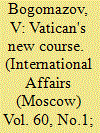

|
|
|
|
|
| Publication |
2014.
|
| Summary/Abstract |
ON MARCH 13, 2013, the conclave of the cardinals of the Roman Catholic Church surprised the world by electing Archbishop of Buenos Aires Jorge Mario Bergoglio as a new Pope. What looked as unexpected and unpredictable is emerging as a deliberate and calculated choice. The cardinals intended to renew and rejuvenate Catholicism, to make it more dynamic and more flexible and, in general, better suited to the globalized world brimming with threats and challenges. The task of this scope and this importance was entrusted to a hierarch who is not young or even middle-aged - he is 76.
|
|
|
|
|
|
|
|
|
|
|
|
|
|
|
|
|
|
|
|
|